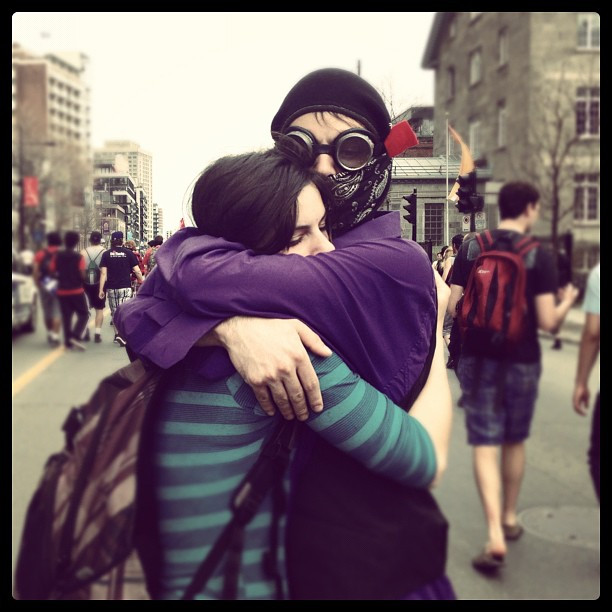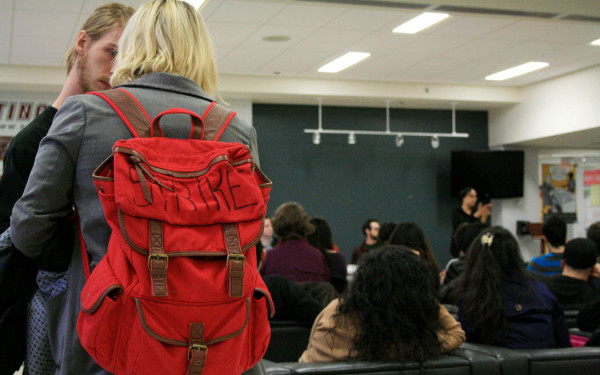Red in the Streets
Over 200,000 Keep Things Peaceful Marching Against Tuition Hikes
Over 200,000 people flooded downtown Montreal on March 22 as part of a demonstration against impending tuition hikes, paralyzing upwards of 50 city blocks throughout the afternoon.
After a month of intensifying student mobilization and protests that featured moments of violence, this demonstration remained peaceful, with police presence remaining relatively low.
Despite tweets from the Service de police de la Ville de Montréal’s official account noting protesters with “pyrotechnic devices” and sticks, there were no arrests, and no reported cases of injury.
‘“It was amazing,” said Concordia Student Union VP External Chad Walcott. “Even we didn’t think that the day would go off without any kind of incident, but it did. The student movement was able to show that we can demonstrate in a massive, peaceful way.”
The Concordia Emergency Response Team was on the ground making sure that everything ran smoothly, ensuring the safety of students and fellow demonstrators alike.
“Originally we heard that there would be no medical intervention on the scene at all, and that the other organizations were told that they weren’t allowed to be within the protest for fear that there would be violence of some sort,” said CERT organizer and Concordia journalism student Arndell Florent LeBlanc.
“That’s why we were certain that we had to go in.”
Roughly 20 volunteers from Concordia, 40 volunteer ambulance students from the Fédération étudiante universitaire du Québec, as well as a dozen or so security kept a close eye on the peaceful demonstration.“We were trying to herd one of the largest groups of people with the smallest staff,” said LeBlanc.
Contingents of students from the major Montreal universities converged on Ste. Catherine St. W. between de la Montagne St. and Bishop St. around noon to rally before the march.
By 1:00 p.m., buses from various universities and CEGEPs across the province—including some Ontario students—had unloaded thousands more to take part in the demonstration.
“We didn’t know how big it was until we got to Berri and they announced there were 200,000 and the last of the people were leaving Place du Canada,” said Walcott. “It was incredible, and something I don’t know if I’ll witness again.”
After converging with another small group on Berri St. and René-Lévesque Blvd., a brief confrontation between protesters occurred after a group of university students attempted to block the van leading the demonstration.
“There are still slight issues of petty politics that happen even at the provincial level with student associations,” said Walcott. “Frankly, I don’t think that Concordia needs to be a part of it, I don’t want Concordia to be involved in it, and I’ll do my best to keep the peace.”
After moving through the streets for roughly five hours, the march finally halted at Viger Parc in the Old Port, where student groups held a rally involving several speeches from student leaders.
By 6:00 p.m. there were still large groups of people occupying Viger Park and much of the surrounding streets, but most of the crowd had dispersed peacefully.
On March 26 the CSU held a Special General Meeting to decide on whether or not to continue the strike, as well as to vote on the minimum agreement in solidarity with three other national student groups. Unable to make quorum, the SGM was adjourned without any votes being cast.
Despite the lack of an amended strike vote, Walcott says the CSU has not run out of steam and will continue to encourage departmental mobilization and working with other schools to put pressure on the Charest government.
Despite the annual Liberal budget being released on March 20 without any revisions concerning the issue of tuition, student groups promise to continue actions, planning to focus their tactics on putting pressure on the economy next.
“I think March 22 was a good way of getting public opinion on our side and to say, ‘Students don’t need to be violent, we don’t need to smash windows to get what we want, we can just demonstrate in massive numbers,’” said Walcott.
“However, if the government [still refuses to listen,] I hope that it won’t change too much.”





2_(2)_600_375_90_s_c1.jpg)

01_600_375_90_s_c1.jpg)
02_600_375_90_s_c1.jpg)